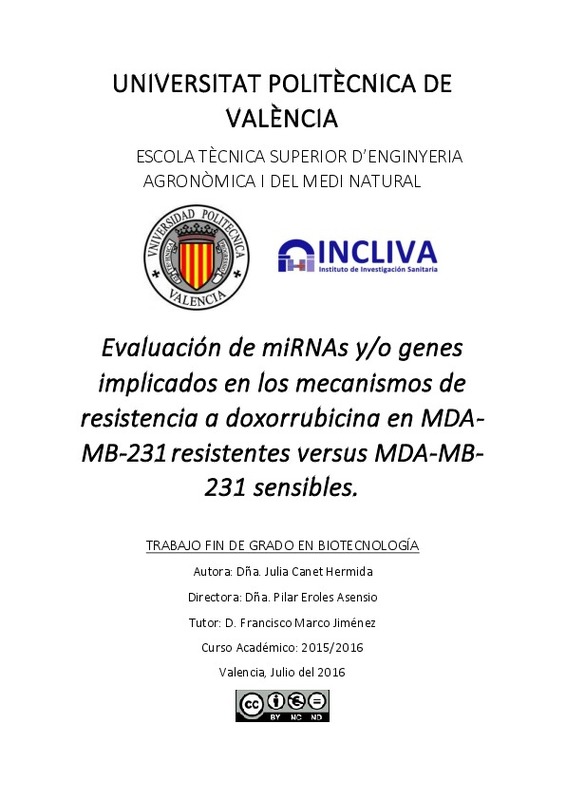JavaScript is disabled for your browser. Some features of this site may not work without it.
Buscar en RiuNet
Listar
Mi cuenta
Estadísticas
Ayuda RiuNet
Admin. UPV
Evaluación de miRNAs y/o genes implicados en los mecanismos de resistencia a Doxorrubicina en MDA-MB-231 resistentes versus MDA-MB-231 sensibles
Mostrar el registro sencillo del ítem
Ficheros en el ítem
| dc.contributor.advisor | Marco Jiménez, Francisco
|
es_ES |
| dc.contributor.advisor | Eroles Asensio, Pilar
|
es_ES |
| dc.contributor.author | Canet Hermida, Julia
|
es_ES |
| dc.date.accessioned | 2016-09-26T09:25:04Z | |
| dc.date.available | 2016-09-26T09:25:04Z | |
| dc.date.created | 2016-09-09 | |
| dc.date.issued | 2016-09-26 | es_ES |
| dc.identifier.uri | http://hdl.handle.net/10251/70425 | |
| dc.description.abstract | [ES] El cáncer de mama es uno de los tumores más frecuentes entre las mujeres de todo el mundo.Avances recientes tanto en diagnóstico como en tratamiento están dando resultados prometedores con un aumento notable de la supervivencia. Sin embargo, la recurrencia de esta enfermedad es un obstáculo para su curación. Actualmente entorno a un 40% de todos los pacientes con cáncer de mama recaen y entre ellos, un 60-70% sufren metástasis. El cáncer de mama triple negativo es un tipo de cáncer muy agresivo, con alto grado de metástasis y un pobre pronóstico. Estudios anteriores han analizado los mecanismos de respuesta a los tratamientos actuales como la Doxorrubicina, a través del análisis de la expresión de genes y miRNAs en líneas celulares MDA-MB-231 y MDA-MB-468. Basándonos en estos estudios, el siguiente Trabajo de fin de grado evaluará algunos de estos resultados a través de líneas celulares MDA-MB-231 resistentes a la Doxorrubicina generadas a partir de líneas sensibles. Para ello, se analizará la expresión diferencial de determinados miRNAs y/o genes entre líneas celulares sensibles y resistentes tratadas con Doxorrubicina con el objetivo de caracterizar y comprender los mecanismos de resistencia presentes en estos tipos celulares y su diferente comportamiento en cuanto a viabilidad, invasión y características cancerígenas se refiere. | es_ES |
| dc.description.abstract | [EN] Breast cancer is the most common cancer in women worldwide. Recent advances in both diagnosis and treatment are giving results with a significant improvement in the survival of patients. Nevertheless, cancer recurrence is an obstacle to healing. Nowadays, around 40% of patients with this disease relapse and amongst them 60-70% metastasize. Triple-negative breast cancer is a very aggressive type with high rate of metastasis and low prognosis. At the present time, this kind of cancer is treated only with chemotherapy. However, there are patients who are treatment resistant. The aim ofthis work was to analyse the miRNAs (hsa-miR-27a-5p, hsa-miR-27b-5p, hsa-miR- 29b-1-5p, hsa-miR-424-3p, hsa-miR-1972, hsa-miR-23a-5p, hsa-miR-1275) and the genes (CDC25A, SIRT1, CCNE2, E2F1, CDK2, GMNN, BCL2, E2F3) as possible mechanisms implicated in the resistance of the doxorubicine. In addition, miRNA hsa-miR-200c-3p expression was evaluated as a possible modulator of CCNE2 and CDK2. To carry out these studies, the cells lines MDA-MB-231 and in the same line with doxorubicin resistance were used. Both lines were cultured with 5µM of doxorubicine during 24 hours. Finally, the expression profiles of the miRNAs and genes were measured by RT-PCR. The obtained results did not show a possible relationship between the miRNAs and doxorubicin resistance. However a differential expression of the genes CDK2 and CCNE2 was observed between resistant and sensitive cell lines. These results suggest the possible involvement of these genes in the mechanism of resistance. Nevertheless, the analysis of the miRNA has-miR- 200c-3p did not show a regulation of CCNE2 and CDK2 by our cellular conditions performed. | es_ES |
| dc.format.extent | 47 | es_ES |
| dc.language | Español | es_ES |
| dc.publisher | Universitat Politècnica de València | es_ES |
| dc.rights | Reconocimiento - No comercial - Sin obra derivada (by-nc-nd) | es_ES |
| dc.subject | Cáncer de mama | es_ES |
| dc.subject | Doxorrubicina | es_ES |
| dc.subject | MiRNA | es_ES |
| dc.subject | MDA-MB-231 | es_ES |
| dc.subject | Triple negative breast cancer | es_ES |
| dc.subject | Doxorubicin | es_ES |
| dc.subject | MiRNAs | es_ES |
| dc.subject | Cell cycle | es_ES |
| dc.subject | Genes | es_ES |
| dc.subject.classification | PRODUCCION ANIMAL | es_ES |
| dc.subject.other | Grado en Biotecnología-Grau en Biotecnologia | es_ES |
| dc.title | Evaluación de miRNAs y/o genes implicados en los mecanismos de resistencia a Doxorrubicina en MDA-MB-231 resistentes versus MDA-MB-231 sensibles | es_ES |
| dc.type | Proyecto/Trabajo fin de carrera/grado | es_ES |
| dc.rights.accessRights | Abierto | es_ES |
| dc.contributor.affiliation | Universitat Politècnica de València. Escuela Técnica Superior de Ingeniería Agronómica y del Medio Natural - Escola Tècnica Superior d'Enginyeria Agronòmica i del Medi Natural | es_ES |
| dc.contributor.affiliation | Universitat Politècnica de València. Departamento de Ciencia Animal - Departament de Ciència Animal | es_ES |
| dc.description.bibliographicCitation | Canet Hermida, J. (2016). Evaluación de miRNAs y/o genes implicados en los mecanismos de resistencia a Doxorrubicina en MDA-MB-231 resistentes versus MDA-MB-231 sensibles. http://hdl.handle.net/10251/70425. | es_ES |
| dc.description.accrualMethod | TFGM | es_ES |
| dc.relation.pasarela | TFGM\49000 | es_ES |
Este ítem aparece en la(s) siguiente(s) colección(ones)
-
ETSIAMN - Trabajos académicos [3541]
Escuela Técnica Superior de Ingeniería Agronómica y del Medio Natural






